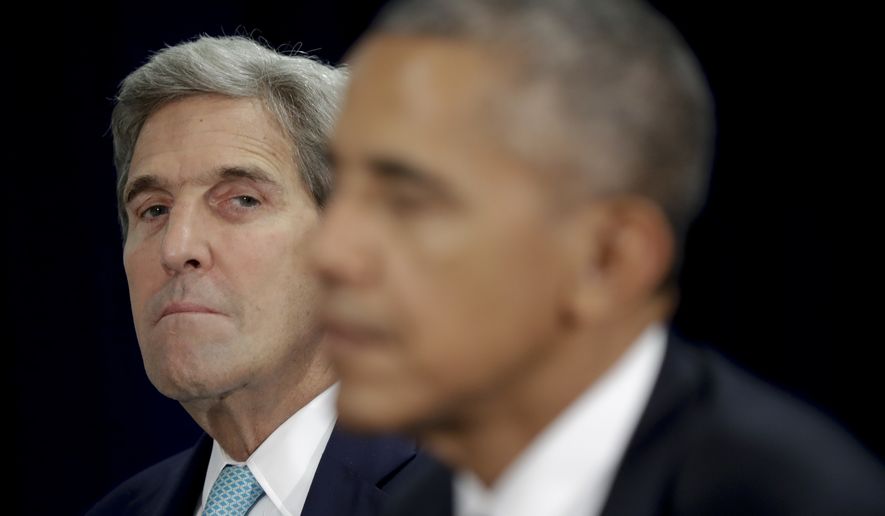Well before Russia’s military came to Bashar Assad’s aid in Syria, the Obama administration calculated that the Islamic State’s expansion in the region would force the Syrian president into negotiating with Washington, according to private comments Secretary of State John F. Kerry made last fall.
Leaked audio captures Mr. Kerry’s closed-door discussion with Syrian activists on the sidelines of the U.N. General Assembly in late September.
Although some details of the meeting have been reported, little attention has been paid to Mr. Kerry’s discussion about a strategy to use the terrorist group’s growing presence in Syria and Iraq as leverage to pressure Mr. Assad.
President Obama has said repeatedly that the Syrian leader must step down to end the country’s brutal civil war.
The State Department on Tuesday forcefully denied any suggestion that the administration ever had a policy of tolerating or trying to use the group, also known as ISIS and ISIL. But Mr. Kerry’s comments, which drew fresh scrutiny in the Arab media last week, raise questions about the extent to which the administration sought to gain from the terrorist group’s prominence to force Mr. Assad to capitulate.
“The reason Russia came in is because ISIL was getting stronger,” Mr. Kerry said on the recording, posted on the website of AMN News, an online aggregator of material focused on the Middle East. “[The Islamic State] was threatening the possibility of going to Damascus and so forth. We were watching. We saw that [the Islamic State] was growing in strength, and we thought Assad was threatened.
“We thought, however, we could probably manage. You know, that Assad might then negotiate,” Mr. Kerry said. “Instead of negotiating he got [Russian President Vladimir] Putin to support him.
“It’s truly complicated,” Mr. Kerry said.
He told the group that he had clashed with others in the Obama administration by advocating behind the scenes for the use of U.S. military force against Mr. Assad before the Russian incursion into Syria in September 2015.
CNN obtained the leaked audio in October. At the time, the State Department declined to comment beyond saying that Mr. Kerry “was grateful for the chance to meet with this group of Syrians, to hear their concerns firsthand and to express our continued focus on ending this civil war.” An editor’s note on CNN’s website says the leaked audio was posted but later removed from the site “at the request of some of the participants out of concern for their safety.”
Islamic State strategy
When pressed Tuesday by The Washington Times about Mr. Kerry’s remarks on the recording, State Department spokesman John Kirby strongly rejected the idea that the administration was somehow willing to allow the Islamic State to rise in Syria. “Any suggestion [that] this administration has been in any way supportive of [Islamic State] brutality flies in the face of the facts and of our concerted leadership of an international coalition designed to defeat the terrorist group,” he said.
Another senior State Department official, who spoke on the condition of anonymity, said Mr. Kerry “never suggested that we had ’a strategy’ to encourage negotiations caused by gain in [Islamic State] strength or that we favored that growth in strength.”
“A simple reading” of what the secretary of state says on the recording “makes clear he was merely commenting on events as they were unfolding,” the official said.
However, Mr. Kerry never indicated in the recording any specific point at which U.S. officials began counting on the Islamic State to threaten the Assad regime.
He may well have been telling the Syrian activists that the administration was watching the terrorist group’s activities in mid-2015 while Russian forces were preparing for their incursion.
But a previously leaked Defense Intelligence Agency memo shows U.S. officials were monitoring the group as far back as 2012 and were even hoping at that time for such a scenario to unfold in Syria.
According to the memo, obtained and published in May by the conservative watchdog group Judicial Watch, a DIA analyst in Baghdad wrote in August 2012 that Salafists were the “major forces driving the insurgency in Syria” and included the “Muslim Brotherhood and AQI” — a reference to the Islamic State’s predecessor, al Qaeda in Iraq. The memo outlined how Western powers, including the U.S., were backing the forces in Syria while others, including Russia, China and Iran, were lining up in support of the Assad regime.
“If the situation unravels, there is the possibility of establishing a declared or undeclared Salafist principality in Eastern Syria,” the memo said. “This is exactly what the supporting powers to the opposition want, in order to isolate the Syrian regime.”
That may have been the plan, but Mr. Assad’s growing isolation did not push him to offer concessions to Washington. Instead, Russian forces deployed in force to Syria to aid Mr. Assad, Moscow’s longtime ally. The situation caused hand-wringing among administration officials.
At the time, Mr. Obama’s former top adviser on Middle East policy wrote in Politico Magazine that the administration would be wise to “revisit some fundamental questions” about its approach to Syria.
“The current policy of the United States and its partners, to increase pressure on Assad so that he ’comes to the table’ and negotiates his own departure — must be rethought,” wrote Philip Gordon, an architect of the administration’s approach as White House coordinator for the Middle East through April 2015.
• Rowan Scarborough contributed to this report.
• Guy Taylor can be reached at gtaylor@washingtontimes.com.




Please read our comment policy before commenting.